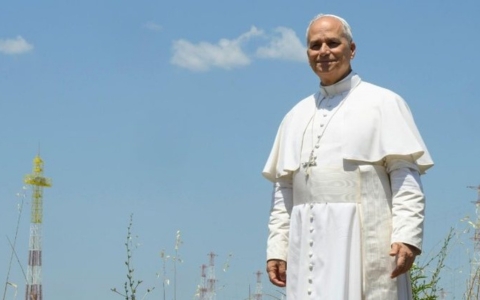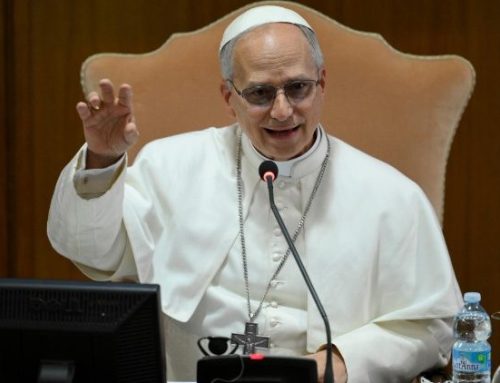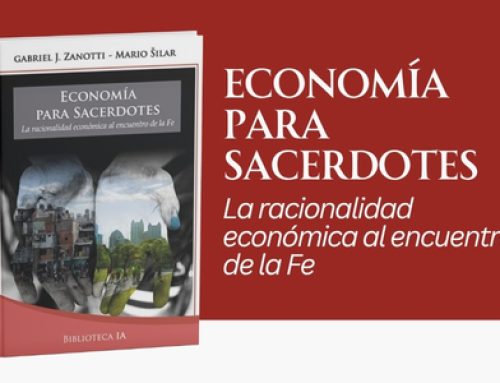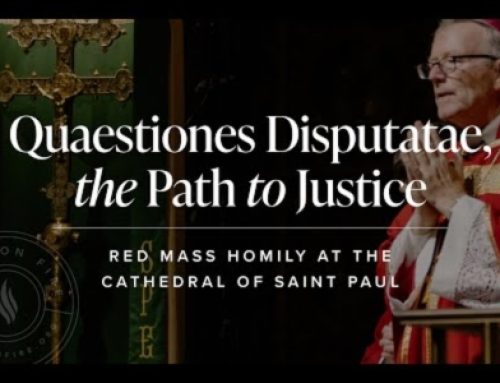Por Caroline Kurt
Fuente: Word on Fire
14 de julio de 2025
Though only nine weeks into his pontificate, Leo XIV has already revealed many of the themes that will likely characterize his papal teaching. A Christ-centered faith, influenced by the spirituality of Augustine and sensitive to the challenges of the modern world, equips the new pope to attract and unite the many branches and factions within the Church.
Christocentrism
In an address to participants in the Jubilee of Oriental Churches, the pope called attention to the Eastern Rites’ “sense of the primacy of God.” This sense is something he himself exemplifies. Throughout his speeches and writings as pope, Leo XIV consistently puts the focus on the person of Jesus Christ and God’s action in the Church and the world. As he said in his Urbi et Orbi address to the crowds gathered in St. Peter’s Square, “All of us are in God’s hands . . . Christ goes before us.”
Leo XIV used his first homily as pope to speak about God’s role in the papacy, rather than his own personal agenda.
“My brother Cardinals, as we celebrate this morning, I invite you to recognize the marvels that the Lord has done, the blessings that the Lord continues to pour out on all of us through the Ministry of Peter,” Leo XIV said.
In the homily, the new pope reflected on the identity of Christ, distinguishing between a worldly view of Jesus and the Christian view.
“There are many settings in which Jesus, although appreciated as a man, is reduced to a kind of charismatic leader or superman,” Leo said. “This is true not only among non-believers but also among many baptized Christians, who thus end up living, at this level, in a state of practical atheism. This is the world that has been entrusted to us, a world in which, as Pope Francis taught us so many times, we are called to bear witness to our joyful faith in Jesus the Saviour . . . ‘the Christ, the Son of the living God.’”
A Church that struggles valiantly against the temptation to fracture can welcome a pope who speaks often and clearly about the most unifying Person.
Motivated by this faith in Christ, Leo commended all believers—himself first and foremost—to “move aside so that Christ may remain, to make oneself small so that he may be known and glorified, to spend oneself to the utmost so that all may have the opportunity to know and love him.”
This abdication of self so that Christ may reign has already allowed Leo XIV to become a unifying figure for the Church. In emphasizing a Christ-centered faith over a politicized or issues-driven religion, Leo XIV can effectively unite Catholics of myriad persuasions and help all Christians remember the reason for their faith.
Indeed, in an address to the Roman clergy, Leo named unity as a great desire of his.
“Particularly close to my heart, is . . . unity and communion,” Leo XIV confessed. “In the so-called ‘priestly’ prayer, as we know, Jesus asked the Father that his people may be one. The Lord knows well that only by being joined to him and united among ourselves can we bear fruit and give credible witness to the world.”
A Christocentric outlook is hardly something Leo invented. But a Church that struggles valiantly against the temptation to fracture can welcome a pope who speaks often and clearly about the most unifying Person.
Augustinian Spirituality
Leo XIV comes to the papacy as the former prior general of the Order of St. Augustine, a role he held from 2001 to 2013. Formed by the Augustinian spirituality, Leo XIV often emphasizes the innate human desire for God and the drama of sin and mercy.
In his address to Eastern Rite Jubilee attendees, Leo XIV commended the importance the Eastern rites assign to prayer, penance, and sorrow for sin.
“Your traditions of spirituality, ancient yet ever new, are medicinal,” Leo XIV said. “In them, the drama of human misery is combined with wonder at God’s mercy, so that our sinfulness does not lead to despair, but opens us to accepting the gracious gift of becoming creatures who are healed, divinized and raised to the heights of heaven.”
Leo XIV echoes his spiritual father, St. Augustine, who wrote at length in his Confessions about guilt and redemption.
“You have put away from me these so wicked and nefarious acts of mine,” Augustine wrote. “To Your grace I attribute it, and to Your mercy, that You have melted away my sin as it were ice.”
Like Augustine sixteen centuries ago, Leo XIV reminds the faithful that this consciousness of human sin and the need for God’s mercy lie at the foundation of the interior life. Contrary to what the world might say, the Church’s teaching on sin is a sign of hope, for only in acknowledging wrongdoing can one receive forgiveness and new life.
Leo XIV’s Augustinian heritage is also evident in his papal coat of arms (which includes the Augustinian image of a pierced, flaming heart above a book) and his papal motto. The motto, In Illo Uno Unum (“In the One we are one”), evokes Augustine’s commentary on Psalm 127, in which he says, “Although we Christians are many, in the one Christ we are one.”
The pope further developed this Augustinian understanding of unity in a June 1 homily commemorating the Jubilee of Families, Children, Grandparents, and the Elderly.
“[Oneness] is the greatest good that we can desire, for this universal union brings about . . . the eternal communion of love that is God himself,” Leo said. “The Lord does not want us, in this unity, to be a nameless and faceless crowd. He wants us to be one: ‘As you, Father, are in me and I am in you, may they also be in us.’”
This homily—delivered by an American pope on the first day of Pride Month and centered around the beauty of marital love—displays Leo XIV’s readiness to respond to the challenges posed by modernity.
Modern Challenges
Leo XIV’s choice of papal name was the first sign he comprehended the world he would guide. He explained in an address shortly after his election why he adopted the name “Leo.”
“Pope Leo XIII in his historic encyclical Rerum Novarum addressed the social question in the context of the first great industrial revolution,” Pope Leo XIV said to the College of Cardinals. “In our own day, the Church offers to everyone the treasury of her social teaching in response to another industrial revolution and to developments in the field of artificial intelligence that pose new challenges for the defence of human dignity, justice and labour.”
In addition to societal concerns, Leo XIV has shown a special awareness of the particular challenges young people face in the twenty-first century.
“Think of the isolation caused by rampant relational models increasingly marked by superficiality, individualism and emotional instability; the spread of patterns of thought weakened by relativism; and the prevalence of rhythms and lifestyles in which there is not enough room for listening, reflection and dialogue, at school, in the family, and sometimes among peers themselves, with consequent loneliness,” Leo XIV said in a May 15 speech.
As with all his homilies and addresses, the pope refrained from scolding, using instead the compassionate tone of a physician offering a much-needed diagnosis and the medicine to fix it.
Leo XIV’s message to participants in a jubilee family seminar unites these three threads of his teaching: Christocentric outlook, Augustinian spirituality, and awareness of the times. The pope approached families as “living members of the Mystical Body of Christ,” united to him through the very person of Jesus Christ. He stressed parents’ duty to present their children with the faith as a sure relationship with God, rather than merely a program of morality.
“The profound thirst for the infinite present in the heart of every human being means that parents have the duty to make their children aware of the fatherhood of God,” Leo XIV said. “In the words of Saint Augustine: ‘As we have the source of life in you, O Lord, in your light we shall see light.’”
Leo XIV used an Augustinian lens to explain the opportunity the twenty-first century affords Catholics.
“Ours is a time marked by a growing search for spirituality, particularly evident in young people, who are longing for authentic relationships and guides in life,” Leo XIV said. “Hence, it is important that the Christian community be farsighted in discerning the challenges of today’s world and in nurturing the desire for faith present in the heart of every man and woman.”
The pope named the “privatization” of religion, a misplaced Catholic reticence about sharing the faith in order to “avoid offense,” as an obstacle to reaching those who could otherwise be receptive: families distant from the Church, cohabitating couples, and those who find themselves disillusioned by the “false footholds” of lesser beliefs.
As he terms it, Leo XIV looks at the “challenges of our times with a prophetic perspective.”
“We are called to embrace these challenges, to interpret them evangelically, to experience them as opportunities to bear witness,” the pope said. “Let us not flee from them!”
Leo XIV’s willingness to place Christ at the center of all, his devotion to and articulation of Augustinian spirituality, and his hunger to engage the wayward modern world is reason for hope: both in the fruits of this pontificate and the salvific work of the Church through every century.





Deja tu comentario